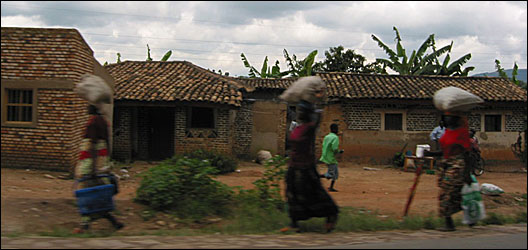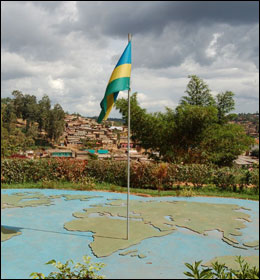‘I Was Sick During the Genocide’: Remembering to Forget in Contemporary Rwanda
‘I Was Sick During the Genocide’: Remembering to Forget in Contemporary Rwanda

Nothing, I remember nothing,” the middle-aged witness insisted to the court. “I was sick during the genocide.” She was standing before a man accused of multiple murders, an audience of her neighbors, and a row of judges at a session of gacaca, one of nine thousand local sessions set up by the Rwandan government in 2001 to try tens of thousands charged with participating in the 1994 genocide. On a Saturday last June, some thirty people from surrounding farms gathered outside a small government building tucked into a space between fields to participate in the trials of three prisoners. The scene was bucolic when I arrived—lush fields, twittering birds, butterflies. The simple structure, a galvanized roof over wooden benches, looked oddly like a picnic pavilion in a quiet American park. But the serenity was belied by the tense silence that hung over the crowd, as everyone waited to begin. The prisoners sat in front. One, a stooped middle-aged man, was nervous and fidgety; the other two, in their mid to late twenties, affected aggressive indifference.
The chief judge eyed the witness with dry bemusement. He’d heard this kind of thing before, evasion so fantastical that it edged into morbid humor. Then he read her the riot act: withholding information from gacaca will bring you a year in jail. But such threats have little effect when the community throws up a wall of obliviousness. The next witness claimed to have been watching her cows from her window when two girls were murdered outside her house.
 Forgetting—let’s call it serious forgetting, for what’s being blanked out is not trivial—is an undercurrent in Rwanda, inside and outside gacaca. The mantra “never forget” assuages the guilt of the international community—it is the comment of choice in the visitors’ books at genocide memorials. But the slogan is largely extraneous to the painful conflicts involved in reconstructing societies after genocides. The need to remember, the pressure to forget: Rwandans must combine these strains into some plausible representation of the past and some acceptable basis for the present and the future.
Forgetting—let’s call it serious forgetting, for what’s being blanked out is not trivial—is an undercurrent in Rwanda, inside and outside gacaca. The mantra “never forget” assuages the guilt of the international community—it is the comment of choice in the visitors’ books at genocide memorials. But the slogan is largely extraneous to the painful conflicts involved in reconstructing societies after genocides. The need to remember, the pressure to forget: Rwandans must combine these strains into some plausible representation of the past and some acceptable basis for the present and the future.
Demographics of the Aftermath
Survivors cannot help but remember; perpetrators and anyone associated with them are inclined to forget. There are far fewer people in the first group than in the second. In the annals of genocide, Rwanda’s situation is unique, because survivors have not migrated in the aftermath, but continue to live alongside the ethnic majority implicated in the genocide. After the Holocaust, Jewish survivors overwhelming...
Subscribe now to read the full article
Online OnlyFor just $19.95 a year, get access to new issues and decades' worth of archives on our site.
|
Print + OnlineFor $35 a year, get new issues delivered to your door and access to our full online archives.
|






